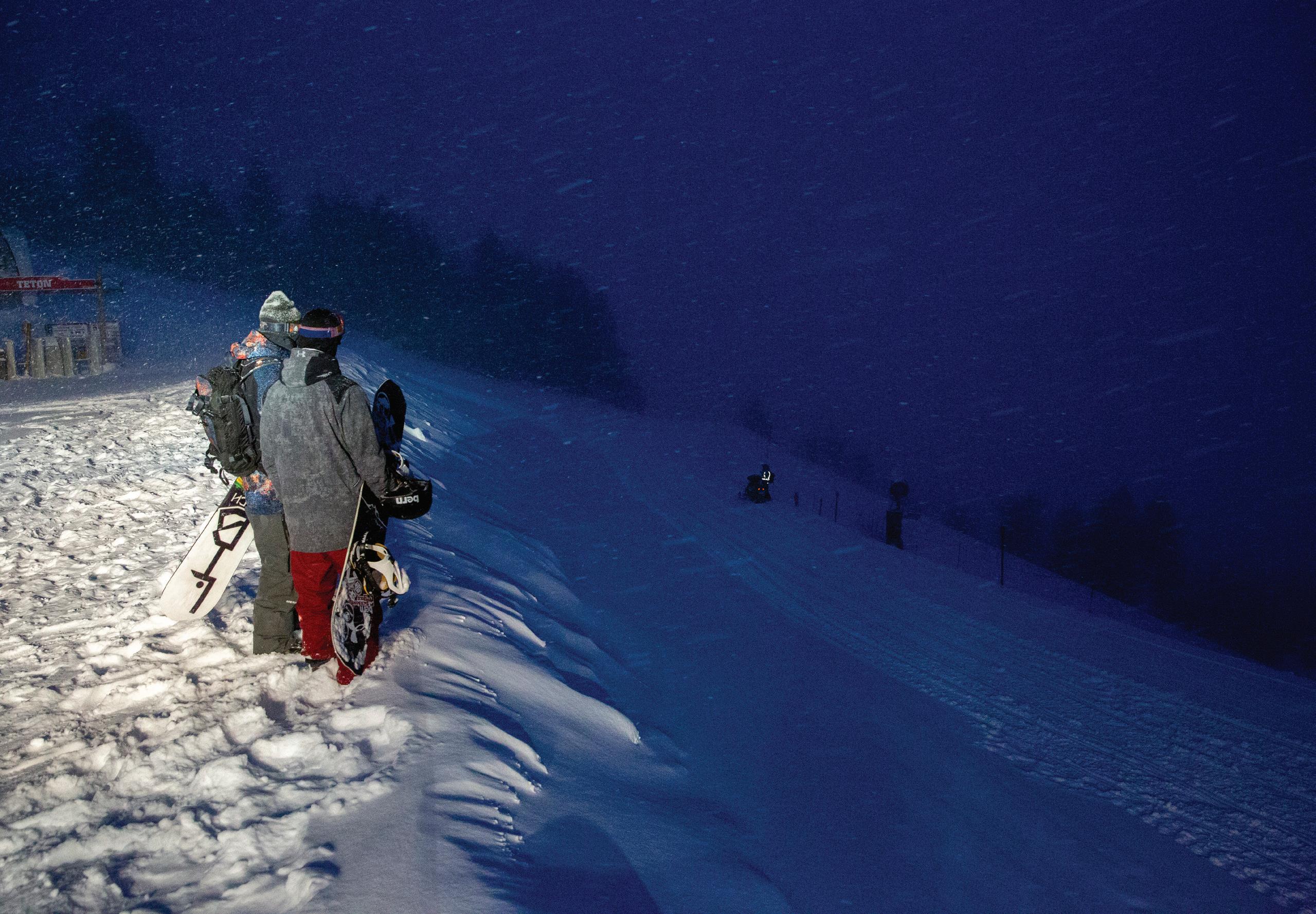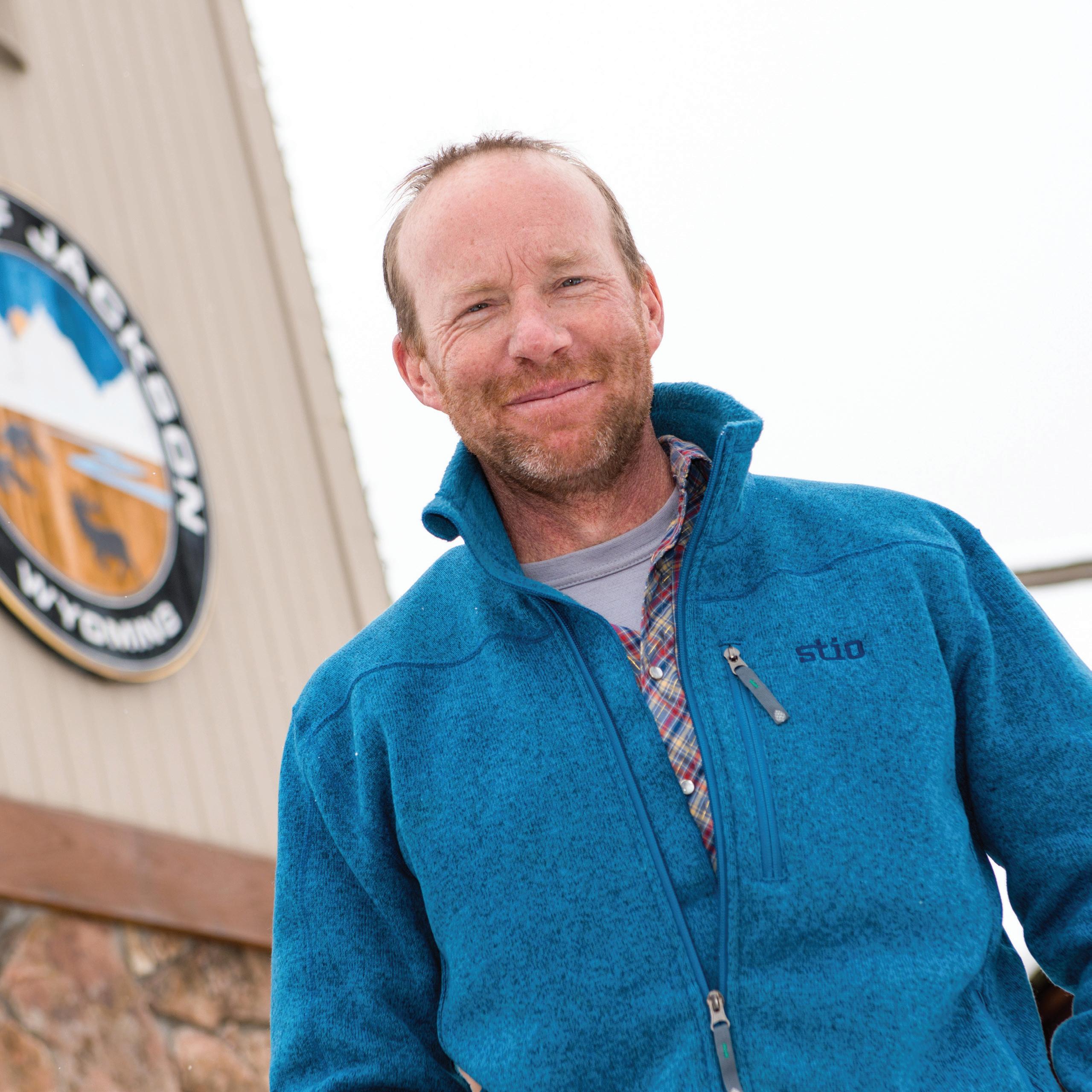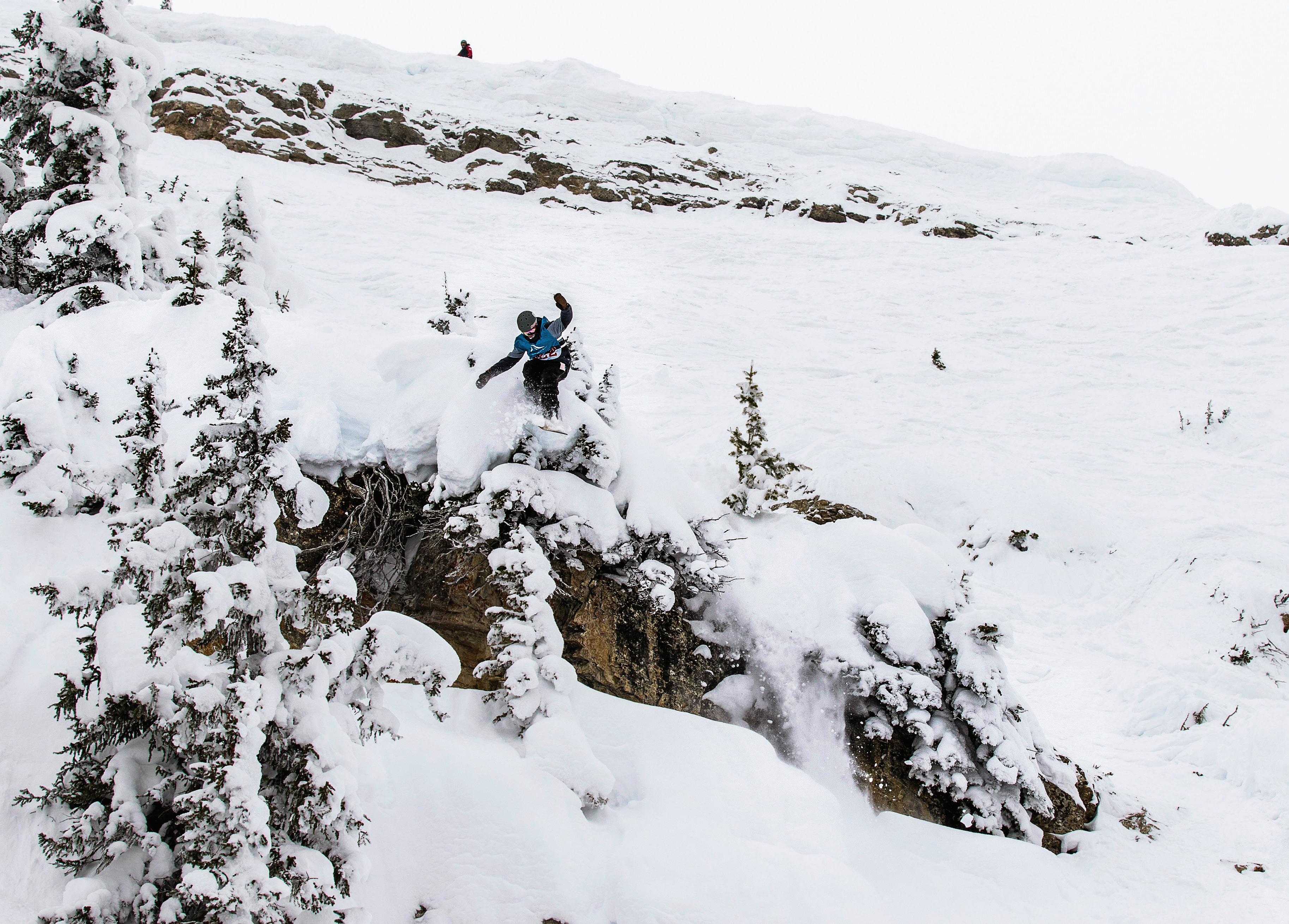
9 minute read
JHSM staff
The riders size up the gap and assess the snow.

Advertisement
spin, the ticket scanners would not beep. Still, cars flooded into the parking lots full of hungry, oblivious riders.
Soon there was enough luminous blue glow for the crew to size up the gap and feel out the landing. The slope had only a small cushion of fresh snow to cover the chunky and mogul-filled face. It did not afford the riders much hope. A mix of tension about the mountain’s shut down, a sprinkle of guilt for being the few on-hill, and the questionable over-the-road launch led the group to bag the shoot for a later day. We savored a few short turns back down to the parking lot, then scattered to our homes to wait out the rest of the storm. That week, road closures, storms and persistently high avalanche conditions kept the valley’s citizenry inside. Indeed, the elements pushed us to ponder things like roof snow load and a lifestyle that hinges on electricity and fuel. But the power was still pumping for most of the area, food was stocked, fuel was there; it wasn’t a dire scene beyond ground zero—a dim Teton Village
In the distance, work crews are already converging and surveying the damage.
road lined with snapped electrical poles and a flurry of workers rushing to fix them.
No, it was not like the islands of the Caribbean decimated by tropical storms or the ravaged Puerto Rico, its people left to fend for themselves in a cruel new water world. It was not like Houston or Florida, swallowed by floods, or like California, where wildfires killed dozens of people and charred thousands of homes. Still, that week in Jackson Hole, like the more calamitous events in other parts of the country, was a potent reminder that Mother Nature, inflamed by climate change, rules the land. It was also a reminder that people have inflamed her, that they are accelerating her wrath. bg Ben Gavelda is the 2017 National Hermit Crab Race Champion.
@bengavelda

blue collar advocate
Snowboarding brought the mayor of Jackson here, but that’s not why he stayed
WORDS: PETE MULDOON
It’s 8:30 on Monday morning and people are piled into the tram line at Jackson Hole Mountain Resort. Fifteen years ago, I would have been standing there too. Instead, I’m sitting in an office catching up on the Monday morning email barrage before a 9 a.m. meeting on re-zoning, an 11 a.m. on parking, a lunch meeting on housing, a 1 p.m. with a county commissioner, an hour of phone calls at 2 p.m., a joint town/county meeting at 3 p.m., and then a Jackson Town Council meeting from 5 p.m. until whenever we get done.
My version of an endless, bottomless backcountry powder run arrived that day during the town council meeting. That’s when a group of local workers and longtime community members made a desperate plea to the council. They needed our support for an affordable housing project in order to continue living in the town they’ve given so much to, a town facing a historic housing crisis. We voted unanimously to move ahead with the project. No, this is not why I moved to Jackson Hole, but it is why I stayed.
I grew up in the flatlands. My dad, an immigrant musician, wound up in the Air Force after moving to the United States from Ireland, and it wasn’t until much later that I realized why we never lived around mountains—you need flat land for runways.
We’d driven through the mountains when I was a kid, moving from flat place to flat place like we did every couple years. I remember my family driving though Glenwood Canyon on I-70 when I was 13—my parents and all six kids were packed into an old Ford station wagon with my brother and I in the far back gaping at the Rocky Mountains. It would be years before I saw any big mountains again, but I never forgot them.
I’d spend the next 14 years in flatter places, before ending up, improbably, as the manager of a restaurant in Killington, Vermont. I’d never been to a ski resort, or even seriously thought about skiing. As a kid, I wasn’t encouraged to have those sorts of dreams. But a guy who worked at the restaurant with me knew how to snowboard, and he got me out on the hill and was patient enough to help me improve. And that’s all it took. Enamored with a taste of mountain life, we decided to move to big mountains, to Jackson Hole, the following winter.
I spent my first JH winter snowboarding six days a week between two jobs, and the next three winters living in Teton Village. It was still quiet back then; very few people were in the backcountry and the mountain remained untracked for days after a storm. But snowboarding became more than making turns; it stitched me into the community. I was a fish out of water in many other ways, but the mountains were a bond I shared with my neighbors.
Like so many Jackson Hole transplants, I’d planned to spend one winter here. That turned into two and then three. Soon I stopped thinking about leaving at all. After all, growing up and then serving in the military, I’d never lived in one place more than a few years, and I didn’t have anywhere to go back to. I wasn’t the only one whose roots became entrenched in Teton soil. The friend I moved to Jackson with still lives here, just a few blocks from me.
It is true that Jackson has never been an easy place to live. You have to want it. To do that, like a lot of people, I’ve worked a mess of jobs—construction, guest services, bartending, special events, painting houses, and the list goes on. I still work at the airport loading bags and pushing planes for SkyWest Airlines and I help run a small music production company.
Over the years, I discovered I wasn’t the only one juggling jobs and making sacrifices for a Jackson address. I began meeting people who motivated me to give back, to protect the most vulnerable members of our community—many who are packing up and moving away because they can no longer afford to live here. I ran for mayor because I wanted to give those residents a voice.
Today, I don’t snowboard as much as I used to. I started a music career, got into paragliding and mountain biking, all which took a share of my time along with my mayoral duties. But I still love to get into the backcountry on a powder day. It’s like going back in time—the nooks and crannies I used to ride look the same. And when I do get out there, I am reminded of an important truth.
I came to Jackson without a college degree and a manual labor resume. Snowboarding brought me here, but this community brought me to where I am today. And for that I owe it a great debt of gratitude.
pm
Pete Muldoon moved to Jackson for the snow but he stuck around for you.
Will Mercer sends a cliff at Grand Targhee during a freeride competition.

Photo: Emmett McLaulin
dropping next
The passion, vision and gratitude of Will Mercer
WORDS: LANCE PITMAN
When Will Mercer was eight years old, he strapped into a snowboard for the first time and a love affair began. But it was not until he was a freshman in high school that he would carve a deep and promising path into snowboarding. That’s when he moved from Riverton, Wyoming, to Jackson Hole. Mercer, 17, is a self-described romantic who sows seeds of passion into everything he does, snowboarding included.
“When we took our family trips to Jackson, I would branch off from my brother and sister, who also snowboarded at the time. My 10-year-old self would go off alone in search of the terrain that I had fantasized about and seen in snowboard films,” he said. “When I got my first powder turns, it was on from there.”
Born in Shreveport, Louisiana, Mercer fed his growing appetite for snowboarding when he moved to Riverton. The young dirt biker would wake up at 5 a.m. and he and his mom would embark on six-hour road trips to Jackson Hole for a day on the mountain. In Jackson, he found a mentor who taught him the fundamentals of riding. He also found a sense of freedom. “When I click in at the top of a run and have the ability to go wherever I want, it is liberating and therapeutic for me,” he said.
After his brother went to college and his sister was in her last year of high school, his parents—aware that Mercer’s talent and riding obsession were swelling—found a way to do the unthinkable: move to a mountain town with a housing crisis. “My parents were scouring for ways to afford the move to Jackson,” Mercer said. “It is a miracle to me, and my mom too, that we found a home here.” Mercer sets himself apart from his peers not only with his riding ability but also with a sense of gratitude. He is keenly aware of how snowboarding and
the move to Jackson Hole changed his life. “From the Jackson Hole Freeride Program to my best riding partner Steven, all the individuals I have met have helped me and my mom make this a reality.”
It was indeed the right decision and Mercer sensed that immediately. He said it felt like somebody hit the reset button on his life. He suddenly found himself surrounded by like-minded riders who pushed him to progress. Now Mercer is gunning for a national championship on the IFSA Freeride Tour. He placed 5th at the North American Championships last year, after a season full of 1st, 2nd and 3rd place finishes at the regional and national level.
His experience freeriding in Jackson Hole is a tool in his competitive toolbox: “Freeriding and competing in freeride do not have a large difference,” he said. “When I freeride I don’t tend to visually inspect things before I ride them, which allows me to snowboard more impulsively; I’m less likely to overthink a feature that I’m nervous about.” In competition, however, Mercer said a lot of inspecting and planning goes into the run. This might not be as fun as freeriding, he said, but it helps him dial in a strong line.
Now Mercer has big, seemingly attainable goals: “When I first started snowboarding I was really into the freeride aspect because of the freedom of line choice. As I have gotten older, though, I have transferred into a more freestyle type of riding. Whatever kind of spin I learn off a jump in the terrain park, I hope to also do off a mega cliff.”
Here in Jackson Hole, that is music to our ears. Ride on, Will.

Photo: Lance Pitman
lp
Sponsors: SPY, Aion Boardshop and Mom
Lance Pitman is head snowboard coach and assistant program director for the Jackson Hole Freeride Program. He grew up riding Jackson Hole and now lives in Victor, Idaho.





